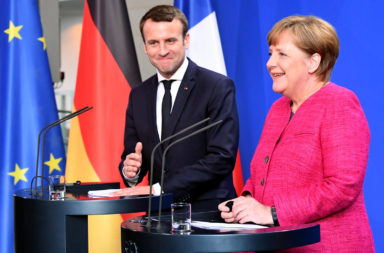German Chancellor Angela Merkel’s home state of Mecklenburg-Vorpommern may be small, with only 1.3M eligible voters out of the country’s 81M people, but the result of the state elections is a bellwether for how difficult the national elections next fall will be for Merkel’s party. GLOBALO has predicted this decline in support for Frau Merkel since ten months ago:
- This summer, Germany suffered the most terror attacks in decades.
- Dr August Hanning, the former director of the BND and state secretary of interior in Berlin, told GLOBALO at the end of last year that Federal Chancellor Angela Merkel’s refugee policy would lead to “instability in our country” and a “renunciation of many people from this constitutional state.” August Hanning is proposing a radical stop to immigration, which Angela Merkel is still avoiding. The statement of the Federal Chancellor’s Government is that the intake capacity of Germany is exhausted for the time being, so Germany is not able to take in any more migrants. The instruction to federal police is to close borders for migrants without an entry permit based on the legal situation, and decline entry for any travelers without an entry permit.
- Too many people do not understand why Angela Merkel does not change her course after more than 1.5 million refugees have reached Germany, with a total cost of more than € 300 billion over the next decades.
Now the result: a big blow in her own home state of Mecklenburg-Vorpommern at the Baltic Sea:
- For the first time, the populist national Alternative for Germany (AfD) party came in ahead of Merkel’s center-right bloc of The Christian Democrats (CDU) in a state election. It is a nightmare for the conservatives in Germany, but also something which has happened before in other European states like France, the UK, and The Netherlands: the rise of national populists. The AfD is anti-Euro, anti-Islam, anti-Immigration and demanding local national solutions.
- The results show that the AfD received 20.8% of the vote, compared to Merkel’s CDU, who only got 19%.
- Most AfD voters wanted to send “a clear sign of frustration with all major parties.” Refugees, Islam, and security were the main drivers. Many were non-voters from the past election, workers, unemployed, and male. It was a clear protest vote. Still 38 percent of voters did not participate and stayed at home.
- Where did the votes for the AfD come from?: 38 percent by former non-voters, 18 percent from SPD, 16 percent from CDU, 14 percent from NPD, and 10 percent from the Left. All major parties lost voters to the new strong opposition.
- The Social Democratic Party (SPD), came out on top with 30.8%. A surprising victory, as the first polls five months ago had predicted only around 25 percent. The strong SPD prime minister Erwin Sellering is very popular. This center-of-the-party frontman wants to continue the grand coalition with the CDU the next five years.
- The neo-Nazi party (NPD), who have been in the legislature of the state for the past decade, did not win any seats this time with only 3 percent.
- The Left Party (Die Linke) lost and only got 13.2 percent. The Green Party is out of the parliament with only 4.8 percent below the necessary 5 percent. The liberal party FDP could not enter the parliament with only 3 percent.
Anti-immigrant AfD trounces Merkel’s Christian Democrats in her home statehttps://t.co/21uwiS7AnE ? pic.twitter.com/MqpObSEKcY
— Wall Street Journal (@WSJ) September 5, 2016
Young CDU-star Diana Kinnert told GLOBALO: “37,000 votes for the AfD came from citizens who voted five years before for The Left, the Social Democratic Party and the Green Party, but only 23,000 from former CDU voters. Many more were non-voters before. Many AfD voters feel insecure in the new world and want to got back to the safe good-old-days.”
Renate Köcher from the Allensbach Institut told a member of the Social Democrats in the German Parliament about the German soul which is today full of angst: “The citizen are pessimists. They have jobs and enough money, but fear the immigrations, terror, international crises, crime and change in society.” The two wars in Ukraine and Syria, together with the huge refugee crisis in Europe, produced German angst. 46 percent think that a vote for the AfD is good, to tell the traditional parties to take the voters more seriously.
Chancellor Merkel has not made immediate comment, as she has been in China for the G-20 Summit. The General Secretary of Merkel’s CDU Peter Tauber called the result “bitter” and said that the AfD has “made right-wing extremism something acceptable.” The AfD’s platform speaks to the fears of Germans who feel their way of life is threatened by migration and refugees. Merkel’s CDU is now trying to co-opt the themes of the far-right, like the concepts of safety and the German homeland, to appeal to the AfD’s voters who are fearful about globalization and migration.
The sister-party CSU from Bavaria wants to limit the number of refugees to 200,000 each year.
Dark day for #Merkel in home state elections https://t.co/fYL6Cy0cbV
— Handelsblatt Global (@HandelsblattGE) September 4, 2016
The far-right AfD’s leader, Frauke Petry, says its victory in Merkel’s home state is a “slap in the face for Ms. Merkel.” There will be five more state elections before the national one next year. Berlin’s vote will happen on the 18th of September. Hopefully, the CDU will fare better against the AfD in upcoming elections.




